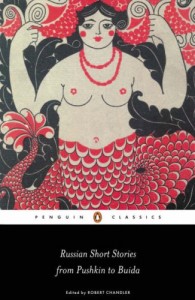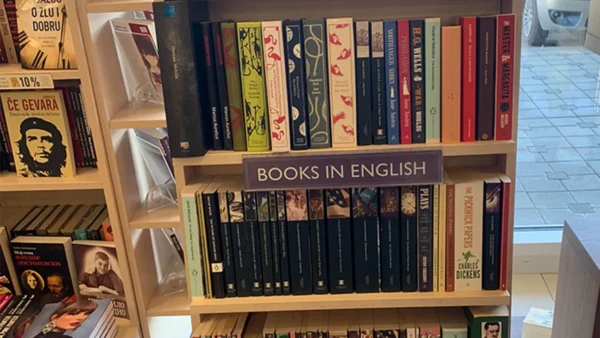For the original post in this series, click here.
Isaak Babel
These three stories come from Babel’s posting as the equivalent of an embedded war correspondent with a Cossack regiment in Poland in 1920. They are not compromised or sanitised in any way, however: the convey the full savagery and horror not only of war but of military life. My First Goose, for example, is set not on the battlefield but in the barracks, where the narrator arrives, a bookish political commissar, and is mocked and threatened by the soldiers. The only way he can establish respect for himself is by stamping on a goose, breaking its neck, skewering it with his sabre and bullying a suicidal old woman into roasting it for him. After this show of savagery, the soldiers finally call him “Brother”. It ends with warmth and brotherhood, sleeping in the hay loft, “all six of us, warming one another, legs entangled, beneath a roof whose holes let in stars. I dreamed, and I dreamed of women, and only my heart, crimson with murder, screeched and bled.” The other two stories follow in similar vein, with brutality and violence everywhere triumphing and yet a strange compassion for everyone involved in it – perhaps because the individuals themselves are not to blame but the situation of the war, which forces them to behave in ways that would in normal life be considered repulsive. Really powerful writing.
Mikhail Zoshchenko
Maybe I’m missing something here, but these six very short pieces don’t seem special to me. They are quite amusing evocations of a period, commenting on the quirks of the system or the absurdities of bureaucracy – for example, all the statements and certificates needed to retrieve a galosh lost on a tram – but I don’t see much beyond that. As I read them, they reminded me of newspaper columns, complaining about a particular incident and poking gentle fun at various aspects of progress. But they weren’t very memorable for me I’m afraid.
Leonid Dobychin
Again, very short pieces, and they didn’t do much for me. Babel’s stories were short, but communicated a lot. These ones just seemed like well-written snapshots of a particular scene, but with little character or plot development. As I looked over them for this review, I barely remembered having read them first time around. I did like the spare, minimalist writing style, so maybe I’d enjoy some of his longer works.
The Third Son and The Return by Andrei Platonov
My first encounter with Platonov, and I loved both of these stories. The Third Son deals with the difficulty of mourning, as six sons come home for their mother’s funeral. They stand around the body but she seems like “an indifferent stranger, an old woman who had nothing to do with them”. An Orthodox priest performs a ceremony, which the mother had wanted, but it means nothing: the sons are just “standing guard around a coffin, not taking part in a service”. Only late at night, when the third son goes in to see the body alone and collapses with grief, can they each go off in secret and mourn their dead mother in their own ways. It’s a very subtle and affecting portrayal of grief and of the emptiness of a lot of formal rituals. The Return was my favourite story in the whole book. Published in 1946, it really conveys how the long years of war changed people and made it difficult to return to peacetime lives. Ivanov had become close to his comrades and to Masha, a girl who had worked in the airfield canteen. As he travels home to his wife and children, he becomes infatuated with Masha and kisses her, the smell of her hair (like autumn leaves fallen in a forest) lingering with him even after he leaves her to continue his journey home. When Ivanov reaches his family, he is filled with regret. He doesn’t recognise his children: his son Petya has had to grow up and help manage the household in hard times, and is quite unpleasant, ordering his sister and mother around and chastising them if they waste a piece of potato by peeling too deep. His daughter Nastya doesn’t even recognise him, and cries when he comes near her. Meanwhile he starts to hate his wife Lyuba, who has accepted help from a man in the town who the children now call “Uncle Semyon”. She insists she was not unfaithful, that she just needed help and he was kind, but Ivanov is furious and calls her a whore and starts to go back on the train to find Masha. The ending is really beautiful, another kind of return, and the whole story really shows perfectly the difficulty of fitting lives back together after they have been torn apart, how you never can really just “return to normal”.
The Old Woman by Danil Kharms
Very, very bizarre. A man sees an old woman in a yard holding a wall clock. He asks her the time. She tells him to look for himself, but the clock has no hands. She tells him it’s a quarter to three, and he thanks her. Later she comes into his room, orders him to kneel down and then lie on the floor, and then dies. The rest of the story is about his comical attempts to dispose of the body, which sometimes comes to life and changes position or even crawls towards him. It’s beautifully written and has a dreamlike (or perhaps nightmare-like) quality, although I wish it had gone somewhere. I get the feeling there was a lot of symbolism in there that I didn’t quite pick up on, but I enjoyed it anyway as a weird, surreal and sometimes outright funny tale.




There are 3 comments
Many thanks for giving this book such careful attention. I am especially delighted that you like the two Platonov stories so much.
I worked on this book for several years, did most of the translations myself and revised them many times. I read through the proofs with enjoyment – I was still happy with the choices I had made – but there were only two writers whom I was still able to read with real wonder: Pushkin and Platonov.
I hope you won’t mind my letting readers know that more of our Platonov translations are available from Harvill Secker and from NYRB Classics. My favourite is SOUL AND OTHER STORIES.
All the best, Robert Chandler
Hi Robert
Thanks for the comment! As I was reading, I thought about how much work must have gone into the book. I’m sure you must have read and worked on a lot of other stories that didn’t make the final cut as well. I know that after going through all the revisions and editing on my own book, I never wanted to read it again! Glad that you still retained a sense of wonder for Pushkin and Platonov. I did love those two Platonov stories, so I will definitely plan to read Soul and Other Stories.